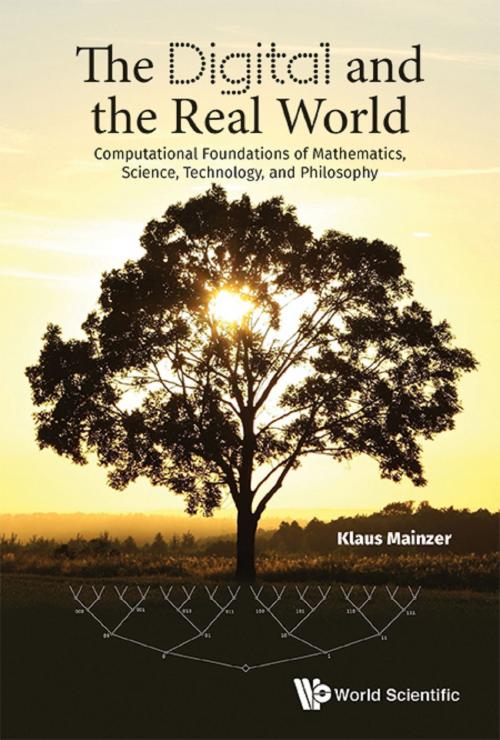The Digital and the Real World
Computational Foundations of Mathematics, Science, Technology, and Philosophy
Nonfiction, Science & Nature, Mathematics, Logic, Computers, Advanced Computing, Computer Science| Author: | Klaus Mainzer | ISBN: | 9789813225503 |
| Publisher: | World Scientific Publishing Company | Publication: | November 17, 2017 |
| Imprint: | WSPC | Language: | English |
| Author: | Klaus Mainzer |
| ISBN: | 9789813225503 |
| Publisher: | World Scientific Publishing Company |
| Publication: | November 17, 2017 |
| Imprint: | WSPC |
| Language: | English |
In the 21st century, digitalization is a global challenge of mankind. Even for the public, it is obvious that our world is increasingly dominated by powerful algorithms and big data. But, how computable is our world? Some people believe that successful problem solving in science, technology, and economies only depends on fast algorithms and data mining. Chances and risks are often not understood, because the foundations of algorithms and information systems are not studied rigorously. Actually, they are deeply rooted in logics, mathematics, computer science and philosophy.
Therefore, this book studies the foundations of mathematics, computer science, and philosophy, in order to guarantee security and reliability of the knowledge by constructive proofs, proof mining and program extraction. We start with the basics of computability theory, proof theory, and information theory. In a second step, we introduce new concepts of information and computing systems, in order to overcome the gap between the digital world of logical programming and the analog world of real computing in mathematics and science. The book also considers consequences for digital and analog physics, computational neuroscience, financial mathematics, and the Internet of Things (IoT).
Errata(s)
Errata (183 KB)
Contents:
- Introduction
- Basics of Computability
- Hierarchies of Computability
- Constructive Proof Theory
- Computational Mathematics and Digital Information Systems
- Intuitionistic Mathematics and Human Creativity
- Proof Mining bridging Logic, Mathematics, and Computer Science
- Reverse Mathematics Bridging Logic, Mathematics, and Computer Science
- From Intuitionistic to Homotopy Type Theory — Bridging Logic, Mathematics, and Computer Science
- Real Computability and Real Analysis
- Complexity Theory of Real Computing
- Real Computing and Neural Networks
- Complexity of Algorithmic Information
- Complexity of Information Dynamics
- Digital and Real Physics
- Digital and Real Computing in the Social World
- Philosophical Outlook
Readership: Undergraduate and graduate students, scientists and readers who are interested in foundational, interdisciplinary, and philosophical questions of mathematics, computer science, and science in general.
Key Features:
- Compact introduction into the foundations of modern mathematics and computer science
- Bridging the gap between digital, real and analog computing by new concepts of information systems
- Consequences in natural and social sciences with respect to scientific computing
In the 21st century, digitalization is a global challenge of mankind. Even for the public, it is obvious that our world is increasingly dominated by powerful algorithms and big data. But, how computable is our world? Some people believe that successful problem solving in science, technology, and economies only depends on fast algorithms and data mining. Chances and risks are often not understood, because the foundations of algorithms and information systems are not studied rigorously. Actually, they are deeply rooted in logics, mathematics, computer science and philosophy.
Therefore, this book studies the foundations of mathematics, computer science, and philosophy, in order to guarantee security and reliability of the knowledge by constructive proofs, proof mining and program extraction. We start with the basics of computability theory, proof theory, and information theory. In a second step, we introduce new concepts of information and computing systems, in order to overcome the gap between the digital world of logical programming and the analog world of real computing in mathematics and science. The book also considers consequences for digital and analog physics, computational neuroscience, financial mathematics, and the Internet of Things (IoT).
Errata(s)
Errata (183 KB)
Contents:
- Introduction
- Basics of Computability
- Hierarchies of Computability
- Constructive Proof Theory
- Computational Mathematics and Digital Information Systems
- Intuitionistic Mathematics and Human Creativity
- Proof Mining bridging Logic, Mathematics, and Computer Science
- Reverse Mathematics Bridging Logic, Mathematics, and Computer Science
- From Intuitionistic to Homotopy Type Theory — Bridging Logic, Mathematics, and Computer Science
- Real Computability and Real Analysis
- Complexity Theory of Real Computing
- Real Computing and Neural Networks
- Complexity of Algorithmic Information
- Complexity of Information Dynamics
- Digital and Real Physics
- Digital and Real Computing in the Social World
- Philosophical Outlook
Readership: Undergraduate and graduate students, scientists and readers who are interested in foundational, interdisciplinary, and philosophical questions of mathematics, computer science, and science in general.
Key Features:
- Compact introduction into the foundations of modern mathematics and computer science
- Bridging the gap between digital, real and analog computing by new concepts of information systems
- Consequences in natural and social sciences with respect to scientific computing















